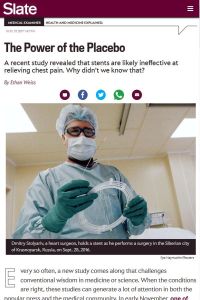
Article
The Power of the Placebo
A recent study revealed that stents are likely ineffective at relieving chest pain. Why didn’t we know that?
Slate,
2017
References:
Al-Lamee et al. (2017)
Recommendation
Among health care professionals, there is a strong emphasis on evidence-based medicine to determine what treatments to prescribe. Cardiologist Ethan Weiss reports on a new study that investigates the value of angioplasty for heart patients. The study found no benefit for stable chest pain when compared to a placebo. This controversial finding could influence how doctors treat their cardiac patients. getAbstract recommends this article to those interested in the pursuit of scientific truth.
Summary
About the Author
Ethan Weiss, MD, is a cardiologist and associate professor at the University of California, San Francisco.









Comment on this summary